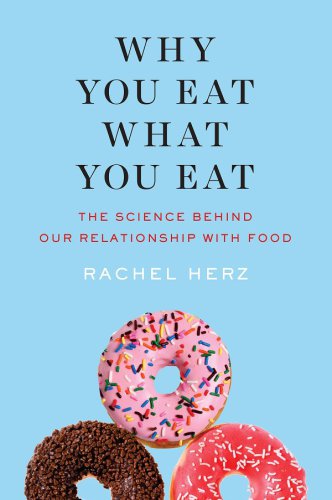
Why You Eat What You Eat
The Science Behind Our Relationship with Food
- اطلاعات
- نقد و بررسی
- دیدگاه کاربران
نقد و بررسی

September 1, 2017
Psychologist and cognitive neuroscientist Herz (psychiatry & human behavior, Brown Univ.; That's Disgusting) incorporates a variety of research about food into her latest book, including vignettes about individuals who exemplify certain medical conditions or situations (i.e., a pathologically picky eater, a victim of a car wreck who can no longer smell and thus no longer taste food). The author ties these studies into coherent narratives, with one chapter seamlessly leading into the next. VERDICT A fun and compelling book that touches upon several subjects. Recommended for a variety of readers, including those interested in food science, marketing, nutrition, and psychology.--Susan Hurst, Miami Univ. Libs., Oxford, OH
Copyright 2017 Library Journal, LLC Used with permission.

September 15, 2017
Neuroscientist Herz (That's Disgusting: Unraveling the Mysteries of Repulsion, 2013, etc.) shines her expertise on the complicated relationships between the human senses and food consumption.Although this is not a diet book, almost every page contains science-based information that could help readers with weight issues gain overall health. Herz understands that eating involves far more than the tongue, the mouth cavity, the teeth, the throat, and the stomach. In mostly lucid scientific detail, she explains how smell, sight, touch, and hearing interact with taste to affect food consumption. The realm of taste is the author's primary focus, as she distinguishes among the "fab four"--sweet, sour, salty, and bitter. Within each, she draws further distinctions, so that "sweet," for example, involves sweet love, sweet pain, and sweet happiness. One of Herz's major strengths is her skill at creating catchy phrasing to convey complicated scientific theories and experiments. She explains why comfort food has justifiably gained that reputation, why some eaters become easily satiated while others say they rarely feel full, and why certain edibles appear scrumptious to the eyes and others look unappetizing. Within each chapter, Herz folds in tips--sometimes based on peer-reviewed research, other times based on her gut feelings--that could qualify as self-help. These include advice on consuming food alone or with others present, how the size and shape of plates can influence calories ingested, playing imagination games before meals to reduce cravings, why the presence or absence of music during meals matters, and how wine consumption with solid food makes sense for some diners but not for others. Regardless of the tips offered or the science discussed, an obvious common denominator is the primacy of the human brain in all food-related matters. Though occasionally didactic, the narrative is undergirded by Herz's understanding that one size never fits all, and it contains useful passages for every reader.
COPYRIGHT(2017) Kirkus Reviews, ALL RIGHTS RESERVED.

October 23, 2017
Herz (That’s Disgusting), a neuroscientist who teaches at Brown University and Boston College, delivers on her promise to explain human eating habits in this research-based work on neurogastronomy. It’s a new field of study, but, as Herz shows, it’s of vital importance to understanding food-related behaviors. Herz first runs through the four basic tastes of sweet, sour, salty, and bitter before expanding to other modes of sensation. She describes other mouth sensations, such as umami and spicy heat, then moves on to how other senses—smell, sight, hearing, and touch—impact food consumption. Once Herz finishes explaining how each sense contributes to an overall evaluation of a given food, which is generally called “flavor,” she moves on to cover the role that the mind plays in eating. It turns out that such factors as the success of a favorite sports team, whom a person eats with, and the simple distance between one’s hand and the candy bowl effect how much a person eats. She also acknowledges the sensory reasons that some people strenuously avoid eating in her chapter on “avoidant/restrictive food intake disorder” and other eating disorders such as anorexia. Though not as entertaining as similar works on food science, Herz’s book illuminates Western eating habits and offers some ways that both individuals and wider society might change in order to make Westerners eat more sanely.




دیدگاه کاربران